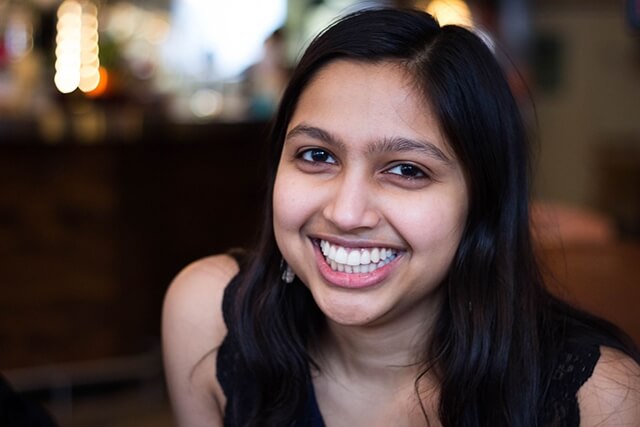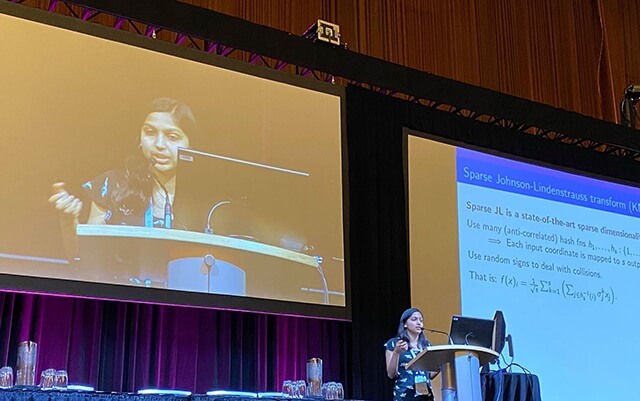Paul and Daisy Soros Fellow Meena Jagadeesan is looking forward to continue working on theoretical computer science and machine learning research problems. (Photo courtesy of Meena Jagadeesan)
For as long as she can remember, Meena Jagadeesan has been passionate about math.
Her parents, who both immigrated to the U.S. from India, are computer scientists; her grandparents taught mathematics; and her older brother went on to become an economist. So during her childhood in Naperville, Ill., math was just a regular part of everyday life.
“Mathematical questions were just something that came up naturally in conversation, even when I was very little,” said Jagadeesan, who received a Paul and Daisy Soros Fellowship for New Americans. “Math always felt very natural for me, and it was something I was always excited about.”
But when she arrived at Harvard (planning to concentrate in math, of course), Jagadeesan was surprised to find that she was drawn even more strongly into computer science.
While taking an algorithms and complexities course as a first-year student, she saw how computer science could provide a way for her to have a concrete impact on the world.
“Computer science provides a powerful toolkit to conceptualize some of the most challenging, multi-faceted problems in society, but then also design algorithms to fix them,” she said.
So Jagadeesan pursued a joint concentration in computer science and math at the John A. Paulson School of Engineering and Applied Sciences, and also a computer science master’s degree, so she could learn the skills to tackle those multi-faceted problems.
She wasted no time.
Computer science provides a powerful toolkit to conceptualize some of the most challenging, multi-faceted problems in society, but then also design algorithms to fix them.
The summer after her freshman year, Jagadeesan started working on research focusing on algorithms for dimensionality reduction, advised by then-Assistant Professor Jelani Nelson, now a Professor in the Department of Electrical Engineering and Computer Science at the University of California, Berkeley.
Dimensionality reduction—a process to reduce the number of dimensions in a dataset—can dramatically improve the runtime and space usage of machine learning and data science tasks.
”What I found that I enjoyed the most about research was being able to think about something for a long time, and then having the freedom to keep thinking about it,” she said. “I didn’t necessarily have to make steady progress every week, and I’m given the freedom to explore what areas interest me and ask my own questions.”
She has continued working on research in dimensionality reduction, and recently wrote a senior thesis under the supervision of Nelson.
Jagadeesan also dove into other research areas, studying signaling mechanisms that play a role in market design with her classmate Alex Wei. That work, advised by Scott Kominers, Associate Professor of Business Administration at the Harvard Business School, focused on the problem companies face when they receive far too many applications for open positions. By giving each applicant a certain number of “signals” they can choose to send to different firms, companies could better identify the applicants who are really interested in each position.
Jagadeesan presents research at the Conference on Neural Information Processing Systems. (Photo courtesy of Meena Jagadeesan)
Her work sought to determine how many signals to give to each applicant to maximize the quality of the match.
The modeling side of the problem presented the biggest challenges; it was difficult to capture the behavior of markets with multiple signals in a tractable way. But Jagadeesan enjoyed working on solutions that could inform real-world decisions.
“Signaling mechanisms could be used in the interview stage of the medical residency process, for instance,” she said. “To me, it is exciting that this research could be used in much broader settings, especially if we have a better understanding of how these mechanisms work from a theoretical perspective.”
Finding applications for theoretical computer science has been a driving force for Jagadeesan. Working with Cynthia Dwork, Gordon McKay Professor of Computer Science, and SEAS Ph.D. student Christina Ilvento, Jagadeesan embarked on a research project focused on the pervasive problem of algorithmic fairness.
She studied systems with multiple stages: for example, a company hiring a team and then awarding raises or promotions. Employees are rated by their performance relative to others on their team, and then those ratings are used to determine rewards. Jagadeesan explored the development of fairness definitions and algorithms that could ensure there is no discrimination in the overall system.
Also within the area of algorithmic fairness, she dove into another research project focused on fairness in online ad auctions with Ilvento and Shuchi Chawla, Professor of Computer Science at the University of Wisconsin – Madison. Studies have shown that individuals from different racial and gender groups often see totally different ads online.
Women, for instance, can see far fewer STEM career ads than men, but the roots of that problem aren’t necessarily cut and dried. Even though employment advertisers may be bidding the same amount on men and women for ads, advertisers from retail might outbid them on women, which leads to women seeing more consumer product ads and fewer STEM career ads, she explained.
“We are trying to understand what fairness means in this setting and then actually design ad auctions that don’t inject this bias into the system, while also preserving a good quality of match and maintaining platform revenue,” she said. “We are very interested in that tradeoff. Hopefully, by quantifying it, our work can inform policy in the long run.”
Jagadeesan is excited to continue working on theoretical computer science and machine learning research problems when she enrolls in the computer science Ph.D. program at the University of California, Berkeley, in the fall.
While she’s not sure if her path will lead her into academia or industry, she hopes that research will play a central role.
As she prepares for her future, Jagadeesan can’t help but reflect on her past, and how the encouragement and support of her mentors and her math-minded family set her on the path she is following today.
“For me, it has been so powerful to hear stories of both success and failure from people who share aspects of my experiences,” she said. “I have been fortunate to have been mentored by incredible researchers, who have been my role models. Hearing stories from their days as students, and from times in which they struggled, has helped me feel more comfortable in the research community.”
Press Contact
Adam Zewe | 617-496-5878 | azewe@seas.harvard.edu

